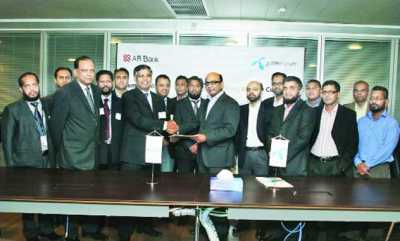Banking
US moves toward legal action against Swiss bank
US authorities are moving toward taking legal action against Wegelin & Co, which could lead to an indictment of one of Switzerland’s last pure private banks, on charges that it enabled wealthy Americans to evade taxes, according to two persons with knowledge of the case. Negotiations in the case have reached a critical stage, with an indictment possible though the bank is seeking a deferred prosecution agreement, which would be less damaging.
The outcome depends on how prosecutors, the U.S. State Department and the U.S. Treasury Department agree to treat the matter, the sources said. Founded in 1741, Wegelin is one of Switzerland’s oldest banks. An indictment of it would be a blow to a national tradition of banking secrecy that dates back to the Middle Ages.
It would be a step forward for a U.S. crackdown on offshore tax evasion by Americans through Swiss banks.
The crackdown started around 2007 with an investigation of UBS AG, Switzerland’s largest bank. It has since spread to the entire Swiss banking industry. Dozens of U.S. clients and at least two dozen Swiss bankers have been charged, in moves that have strained U.S.-Swiss relations.
Albena Bjorck, a spokeswoman for Wegelin, declined to comment on Friday when asked whether the bank was considering the possibility of being indicted.
Charles Miller, a Justice Department spokesman, declined to comment. The latest turn in the Wegelin case comes amid a broad criminal probe by the U.S. Justice Department of 11 Swiss and Swiss-style banks, including Wegelin, suspected of selling offshore tax evasion services to tens of thousands of wealthy Americans. Inquiries, growing out of scrutiny of UBS, are focused on Credit Suisse AG and Basler Kantonalbank among others.
Basler Kantonalbank confirmed a year ago that it was under investigation and in contact with U.S. authorities. Credit Suisse said in July its offshore private banking practices were under investigation and that it would “continue to cooperate with the U.S. authorities.”
On a parallel track, Swiss government officials and the U.S. Internal Revenue Service are trying to negotiate a civil settlement for more than 300 other Swiss banks - the remainder of the Swiss banking industry - on the matter of private banking services that may have enabled tax evasion.
The Daily Independent/Bangladesh/ 10th Jan 2012
IFIC Bank rewards meritorious students
IFIC Bank Employees Contributory Welfare Fund recently provided cash rewards to meritorious children’s of the Bank’s employees who obtained GPA-5 in the S.S.C and H.S.C examination and outstanding result in “O” and “A” level examination in 2011, says press release. Mohammad Abdullah, managing director, Mati-ul Hasan, deputy managing director (Business), Zaitun Sayef, deputy managing director (Risk management), and Waker Hasan, deputy managing director (Operation), attended the programme, among others.
The managing director of the Bank distributed cash rewards and certificates among the students.
The Daily Independent/Bangladesh/ 10th Jan 2012
Scrapping of lending rate cap to impact banking positively
Bangladesh Bank's (BB) decision to withdraw lending cap would create a congenial atmosphere for healthy growth of the banking sector, a top banker has said.
The central bank issued last week a circular to withdraw the interest rate ceiling on lending by banks, aiming at boosting flow of funds to the private sector, especially to maintain growth equilibrium in the industrial sector. In an exclusive interview with The Independent, Mohammad Ali, chief executive officer (CEO) and managing director (MD) of Social Islami Bank Ltd, welcomed the decision of the central bank.
“It's a timely decision, and would result in 'fair play' by Banks, in case of investment, ” Ali said.
“There'll be no room for shady operators who try to book profits by any means.
Quality banks and quality entrepreneurs will sustain.”
In an open market economy, investment is based on demand and supply. So, the entire banking sector would move through a healthy competition towards sustainability as the rate of interest for lending will be determined by the market, he said.
On Islamic banking system, he said the Islamic banks are least affected, amid the ongoing liquidity crisis because of its uniqueness. Ali said the uniqueness is in finding productive and viable investment options for generating economic growth by creating employment through industrial and agricultural expansion.
“When many conventional banks are affected, Islamic banks in Bangladesh have proved to be efficient in absorbing shock because of the system’s inner beauty.” He said the financial products of Islamic banks in the country avoid effective investments and avoid high velocity of money that cause rise in inflation.
On liquidity status of banks, Ali said in 2010, Banks had invested more than capacity, without assessing the viability in an appropriate way, which resulted in loss of funds in capital markets.
He said problems of liquidity came from there. However, the sudden intervention of the central bank in pulling down CDR and IDR has saved many banks from losing more, though, initially, it appeared that the central bank's intervention had caused the loss, he noted.
Meanwhile, high import costs and borrowings by the government also led to the liquidity crisis, he said. A bank must mobilise deposits, in sync with its investment portfolio, to avoid liquidity crisis, he added. Talking about SIBL's operations in the recent past, Ali said the Bank had been plagued with multiple problems, before he took over charges in November 2010. He said all the financial indicators were down.
“A large volume of classified loans, declining status of foreign currency holdings, poor investment planning, and capital inadequacy, together, resulted in an image crisis for the Bank,” he said.
After taking over, Ali said, he brought significant improvement in reducing classified loans, risk management and policy planning. “In 2011, we have been able to bring back confidence in our strength, and, in 2012, our mission is to fine-tune operations in areas where we had the least successes,” he said.
“Classified loans reduced to 4.35 per cent in 2011, from 4.76 per cent in 2010,” he said.
According to SIBL statistics, areas that saw significant improvements were deposit collection, investment, export and import services, remittances, and, eventual, profit.
In 2010, the Bank's profit was at Tk 163 crore, which almost doubled to Tk 306 crore in 2011.
Deposit mobilisation was at Tk 4,485.08 crore in 2010, which rose to Tk 6,713.24 crore in 2011. Investment increased from Tk 3,668.02 in 2010, to Tk 5,390.85 crore in 2011. Remittance mobilisation increased from Tk 211 crore in 2010 to Tk 513 crore in 2011. Export realisation rose to Tk 3,497 crore in 2011 from Tk 2,137 crore in 2010, while import financing rose to Tk 6,820 crore in 2011 from Tk 3,946 crore in 2010.
The SIBL CEO said the management of his Bank is sincerely working to develop the customer base. He said the objectives of a bank should not just focus on earning profits by selling products. “Rather, a bank should have clear policy to contribute to the GDP (Gross Domestic Product), apart from its social responsibilities.” He said the current management of SIBL has put down due importance to promote and expand small and medium enterprises (SMEs) and agro-based industry by providing adequate financing, which largely addresses unemployment.
“Employment largely impacts the economic growth, and our Bank has a big push in it.”
The SIBL CEO said the Bank is trying to diversify financial services. “All investment should not be put into a single basket as many issues in this country remain unresolved and banks have something to do.”
Ali said that his Bank is moving towards social business by adopting policies for green banking and encouraging clients to use solar panel and let industries to leave 'no pollution' to environment.
He said SIBL is working to use CSR (Corporate Social Responsibility) funds for establishing skill development institutions in the city, in order to create skilled workers who can go abroad to earn back for the country.
He said all the Islami banks have to contribute to a common Jakat fund that mobilises a significant amount every year, which will be utilised in establishing skill development institutes.
He said every Islamic bank contributes 2.5 per cent of its profits to the fund.
Ali said his Bank has a complete package for people willing to go abroad, starting from skill development to credit for travel.
He said the remitters, exporters and industrialists bringing in money to the country should be honoured by the state as they have a genuine stake in the country's economy. He said SIBL has awarded crest in 2010 to all those exporters who are its clients. In 2011, SIBL had honoured scholars in different areas.
He said SIBL has developed a good reputation in the last couple of years. It has launched online financial services and opened a call-centre to record complaints from customers, aiming to provide hassle-free services.
The call-centre has access to the central server that connects all 76 of the Bank's branches across the country.
On January 14, the bank is going to change its logo in a formal event at Cox's Bazar sea-beach. “We are dreaming of a new dawn,” signed off the CEO.
The Daily Independent/Bangladesh/ 10th Jan 2012
EBL to build 14-story head office
 Chairman of Eastern Bank Limited Mohd Noor Ali unveils the foundation plaque of Bank's corporate office building at Gulshan Avenue of the city on Sunday. The Bank's directors and managing director, among other senior officials, were also present on the occasion.
Chairman of Eastern Bank Limited Mohd Noor Ali unveils the foundation plaque of Bank's corporate office building at Gulshan Avenue of the city on Sunday. The Bank's directors and managing director, among other senior officials, were also present on the occasion.
Eastern Bank Limited (EBL) laid foundation stone for its corporate headquarters at Gulshan Avenue in the city.
The Bank's chairman Mohd. Noor Ali formally unveiled plaque of a state-of- the-art 14-storey building recently, says a press release.
EBL directors A.Q.I. Chowdhury OBE, Md. Showkat Ali Chowdhury, Mir Nasir Hossain, Gazi Md. Shakhawat Hossain, Ormaan Rafay Nizam and managing director Ali Reza Iftekhar, amomg other officials, were also present at the function.
The Daily Sun/Bangladesh/ 10th Jan 2012
AB inks with GP on utility bill payment
 Majedur Rahman, additional managing director of AB Bank and Raihan Shamsi CEO of GP, exchange documents of a MoU signed in the city recently.
Majedur Rahman, additional managing director of AB Bank and Raihan Shamsi CEO of GP, exchange documents of a MoU signed in the city recently.
AB Bank Limited and Grameenphone Limited signed a Memorandum of Understanding (MOU) on utility bill payment service.
Under the MOU, AB Bank branches across the country will offer services to GrameenPhone Limited for payment of their electricity bills, said a press release.
Majedur Rahman, additional managing director of the Bank and Raihan Shamsi CEO of GP exchanged documents of the recently signed MoU on behalf of their respective organisations.
AB Bank's deputy managing director Shamim A Chaudhury, its relationship manager of Islami banking branch and senior vice president ABM Abdus Sattar, GP's director of Corporate Finance and Treasury Md Mainur Rahman Bhuiyan, GM (Payment System) Md Saiful Islam were also present.
The Daily Sun/Bangladesh/ 10th Jan 2012



